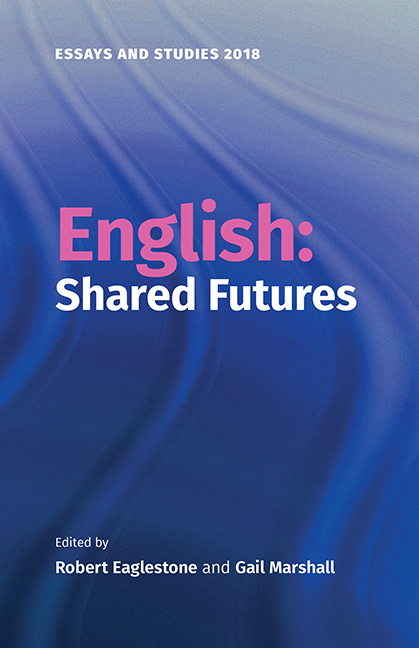Book contents
- Frontmatter
- Contents
- Notes on Contributors
- Acknowledgements
- Abbreviations
- Introduction
- The Changing Picture of School English
- From A-Level to HE: Working Towards a Shared Future?
- English Outreach: Academics in the Classroom
- From Provider to Stager: The Future of Teaching English in HE
- Pedagogic Criticism: An Introduction
- Exquisite Tensions – Narrating the BAME ECA Experience
- Postgraduate Futures: Voices and Views
- Shared Futures: Early Career Academics in English Studies
- Some Reflections on the Funding of English Departments
- English: The Future of Publishing
- Digital Futures
- A View from the United States: The Crisis in the Humanities; the Liberal Arts; and English in the Military Academy
- The Future of Borders
- ‘Between and Across Languages’: Writing in Scotland and Wales
- Exploring Intersections between Creative and Critical Writing: An Interview with Elleke Boehmer
- Integrating English
- Employability in English Studies
- Creative Living: How Creative Writing Courses Help to Prepare for Life-long Careers
- Practice at Large: How Creative Writing can Enhance University Research Environments
- ‘And who can turn away?’ Witnessing a Shared Dystopia
- English and the Public Good
- ‘Can Wisdom be put in a silver rod? / Or Love in a golden bowl?’ On Not Defending the Humanities
- ‘Something Real to Carry Home When Day Is Done’: The Reader in Future
- Afterword
- Index
Afterword
Published online by Cambridge University Press: 15 October 2019
- Frontmatter
- Contents
- Notes on Contributors
- Acknowledgements
- Abbreviations
- Introduction
- The Changing Picture of School English
- From A-Level to HE: Working Towards a Shared Future?
- English Outreach: Academics in the Classroom
- From Provider to Stager: The Future of Teaching English in HE
- Pedagogic Criticism: An Introduction
- Exquisite Tensions – Narrating the BAME ECA Experience
- Postgraduate Futures: Voices and Views
- Shared Futures: Early Career Academics in English Studies
- Some Reflections on the Funding of English Departments
- English: The Future of Publishing
- Digital Futures
- A View from the United States: The Crisis in the Humanities; the Liberal Arts; and English in the Military Academy
- The Future of Borders
- ‘Between and Across Languages’: Writing in Scotland and Wales
- Exploring Intersections between Creative and Critical Writing: An Interview with Elleke Boehmer
- Integrating English
- Employability in English Studies
- Creative Living: How Creative Writing Courses Help to Prepare for Life-long Careers
- Practice at Large: How Creative Writing can Enhance University Research Environments
- ‘And who can turn away?’ Witnessing a Shared Dystopia
- English and the Public Good
- ‘Can Wisdom be put in a silver rod? / Or Love in a golden bowl?’ On Not Defending the Humanities
- ‘Something Real to Carry Home When Day Is Done’: The Reader in Future
- Afterword
- Index
Summary
Oh Christ, not another bloody conference! Who needs them? And a mega-conference, to boot: even more papers I don't want to hear and even more people I don't want to meet…
I am not – how shall I put it? – a natural conference animal. Some mixture of intellectual impatience, inability to sit still for long periods, and a resistance to all that promiscuous nodding and agreeing has led me largely to shun such events. But, as a result of some fatal brew of duty and delusion, I had let myself in for this one, and anyway there would be the consolations of Grey Street and Newcastle's surprisingly rich legacy of 1820s and 1830s architecture, as well as the chance to see more by going running with one of my fellow-panellists. And once I was there, I thought I might as well go to as many sessions as possible: as in other areas of life, hope retains an astonishing capacity to triumph over experience.
This is not a conversion narrative. I didn't suddenly see the light, and I will admit to sneaking out to a nearby Caffé Nero at one point, partly just to have (better) coffee, but partly to escape for half an hour from the obligation to be so nice to everyone. But I did notice that even I, least promising of recruits, seemed to be getting caught up in the spirit of the thing, and I made sure I was back in time for the beginning of the next session.
My choice of which sessions to attend was dictated by an unsteady combination of intellectual inclination and self-improvement. That I went to sessions called things like ‘Broadcasting English’ and ‘Literary criticism in an age of radical politics’ may have been predictable, but in the end I spent even more time going to sessions on ‘employability’, ‘funding’, ‘early-career opportunities’, and so on. I have had, by any standards, an extraordinarily fortunate career, holding tenured posts in excellent universities during better times. People like me need to hear from, and not just about, those whose circumstances have been dramatically less favourable, not as a kind of voyeurism or slumming, but to keep us real and to chasten our sense of what it takes to go on teaching English as a member of British academia's growing precariat.
- Type
- Chapter
- Information
- English: Shared Futures , pp. 217 - 219Publisher: Boydell & BrewerPrint publication year: 2018

